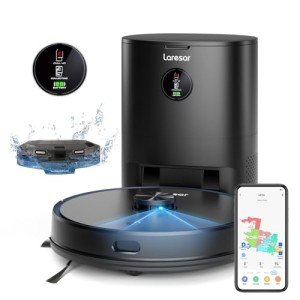The Future of Home Cleaning: A Comprehensive Guide to Robot Vacuums and Cleaners
Recently, the development of robot vacuums and cleaners has transformed the landscape of home cleaning. These autonomous gadgets integrate sophisticated technology with user benefit, using a service for hectic households that look for to minimize the time invested in cleaning tasks. This article checks out the types, features, benefits, and often asked concerns about robot vacuums and cleaners, presenting a clear understanding of how they can boost life.
What is a Robot Vacuum and Cleaner?
A robot vacuum and cleaner is a self-operating device developed to autonomously browse and tidy floorings. It utilizes a combination of sensors, cameras, and expert system to map spaces and identify challenges, effectively vacuuming various surfaces consisting of carpets, hardwood floors, and tiles. Some models also include mopping abilities, enabling them to scrub and decontaminate difficult floorings.
Types of Robot Vacuums and Cleaners
Robot vacuums can be found in a number of types, each designed to cater to specific cleaning needs.
| Kind Of Robot Vacuum | Description | Best For |
|---|---|---|
| Fundamental Robot Vacuum | Entry-level vacuums that supply vital cleaning company without advanced functions. | Budget-conscious users |
| Smart Robot Vacuum | Functions Wi-Fi connection, app control, and voice control compatibility with smart home gadgets. | Tech-savvy people |
| Roaming Robot Vacuum | Equipped with sophisticated navigation systems, these vacuums expertly map big locations efficiently. | Large homes and open areas |
| Hybrid Robot Vacuum | Combines vacuuming and mopping functions in one device. | Users trying to find multi-functional cleaning solutions |
| Pet Hair Robot Vacuum | Created with unique brushes and strong suction abilities to deal with family pet hair. | Family pet owners |
Key Features to Consider
When choosing the ideal robot vacuum or cleaner, buyers need to consider different functions that affect efficiency and functionality.
- Suction Power: This is important for deep cleaning carpets and efficiently getting particles.
- Battery Life: Longer battery life permits the vacuum to tidy bigger locations without disruption.
- Navigation Technology: Advanced models utilize laser or video camera navigation, while standard designs rely on bump sensors.
- Smart Home Integration: Compatibility with platforms like Amazon Alexa or Google Assistant can improve user experience.
- Filtration System: High-efficiency particle air (HEPA) filters are important for asthma or allergic reaction sufferers, recording fine dust and irritants.
- Dustbin Capacity: Larger dustbins need less frequent emptying, making upkeep easier.
- Mopping Functionality: Some models feature mopping functions for cleaning difficult surfaces.
- Noise Level: Quieter robots enable unobtrusive cleaning, specifically in noise-sensitive environments.
Advantages of Using Robot Vacuums and Cleaners
The adoption of robot vacuums brings various benefits that make them an appealing option for numerous households.
- Time-saving: They operate autonomously, allowing users to maximize time for other activities.
- Convenience: Many designs can be scheduled to clean at specific times, providing flexible alternatives.
- Consistent Cleaning: Regular cleaning cycles lead to a consistently neat living environment.
- Accessibility: Robotic vacuums can access hard locations, like under furniture, that traditional vacuums might fight with.
- Improved Air Quality: Regular usage can lower dust and irritants, contributing to a healthier home environment.
Often Asked Questions (FAQs)
1. How do robot vacuums handle challenges?
The majority of modern robot vacuums are geared up with sensors that help them detect and prevent obstacles. link -end models use innovative mapping technologies to create a layout of the environment, enabling more efficient navigation.
2. How often should I run my robot vacuum?
The frequency of usage depends on your household's needs. Normally, running the robot vacuum a number of times a week is suggested, particularly in homes with animals or high foot traffic.
3. Can a robot vacuum manage animal hair successfully?
Yes, many designs are particularly developed for pet owners, featuring effective suction and specialized brushes to take on pet hair and dander effectively.
4. Can I manage my robot vacuum with my mobile phone?
The majority of smart robot vacuums come with a matching mobile app that enables users to control settings, schedule cleaning sessions, and even monitor the cleaning activity from their mobile phones.
5. Do robot vacuums just work on hard floors?
While numerous robot vacuums are created for hard floors, lots of models can also efficiently clean carpets, making them versatile for numerous flooring types.
6. What is the average life-span of a robot vacuum?
The lifespan of a robot vacuum usually varies from 3 to 5 years, depending on use, care, and the design's quality.
Robot vacuums and cleaners have changed household cleaning routines, supplying time-saving services with very little effort. While there are numerous alternatives offered, prospective purchasers need to thoroughly evaluate their requirements versus the features offered by numerous models. As innovation continues to advance, robot vacuums are likely to become even smarter and more effective, fundamentally altering how individuals approach home cleaning. Welcoming this innovation suggests taking pleasure in a cleaner home while focusing on what really matters in life: costs time with friends and family.
With the ideal robot vacuum or cleaner, the future of home cleaning looks both smart and effortless.

